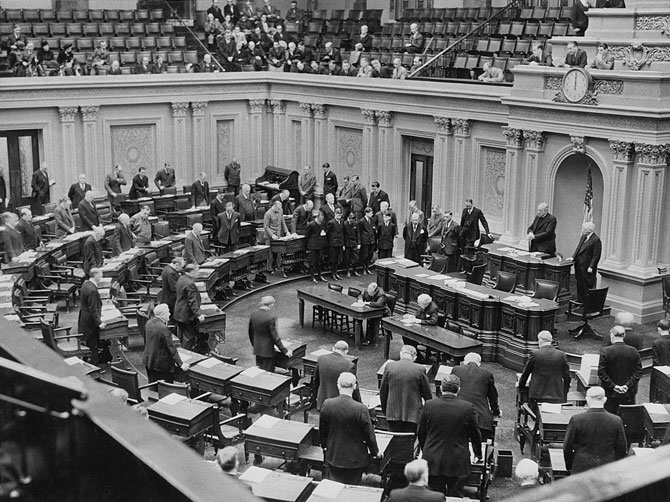 The clock was ticking … till it stopped.Courtesy Osha DavidsonJust ten days ago, Arizona state Senator Barbara Leff (R-Paradise Valley) stood before a House committee, making the case for a bill she had written. “The Quality Jobs Through Renewable Energy Bill,” was needed, she said, to make Arizona the leader in solar [power].” Not just in the nation, but potentially throughout the world.
The clock was ticking … till it stopped.Courtesy Osha DavidsonJust ten days ago, Arizona state Senator Barbara Leff (R-Paradise Valley) stood before a House committee, making the case for a bill she had written. “The Quality Jobs Through Renewable Energy Bill,” was needed, she said, to make Arizona the leader in solar [power].” Not just in the nation, but potentially throughout the world.
Leff reminded Representatives that we are in a period of transition. Fossil fuels are the past (why do you think they’re called fossil fuels?). Solar is the future.
Senate Bill 1403 can help the state move forward, Leff concluded. No good alternative exists, because “we can’t turn back the clock.”
No? Can we not?
OK. No, we can’t. But last week, Leff’s colleagues did the next best thing: they made time stand still!
Ha! And some people have said that the Republican-controlled Arizona legislature makes the Texas legislature look like a Mensa gathering. How many other legislative bodies can stop time, huh? Of course, if one were perverse, one might point out that no other similar body has needed to freeze time quite so badly as Arizona.
Speaking of time travel, let’s go back just a bit so that you can see how the strange events of the last few days came about.
Blame it on Obama
That’s right. The Socialist in Chief forced the Arizona legislature to stop time. He did it by stealing our governor, Democrat Janet Napolitano, and making her the head of Homeland Security. That meant that Arizona’s Republican Secretary of State, Jan Brewer, ascended to the Governor’s office.
Napolitano had a decent working relationship with the Republicanlegislature. They’d fight now and then, but the people’s business got done. Basic things, like, for example, the state budget. Sometimes it got down to the wire, and tempers flared. But by June 30th of every year, the state had a budget in place. Which is a good thing, because no budget = government shutdown.
That may sound great to wealthy libertarians (at least until their homes catch fire and they decide that fire departments are handy institutions to have around). But to schlubs like you and me who work for a living, a government shutdown is no joke. Thousands of state employees are told not to show up. Need to get your driver’s license renewed? Sorry, DMV had to shut down. And don’t even think about taking the light rail. Sure, it’s the city’s baby, but it depends on money from the state, too.
And on and on. Not so very much fun.
Republican legislators and Governor Brewer couldn’t agree on a whole set of issues, most of them linked to the state’s dire financial situation. Arizona is looking at a $3 billion shortfall in the fiscal year that just began. (Which, incidentally, is what prompted Leff’s bill. The whole purpose is to attract companies that manufacture equipment for producing renewable energy, especially solar.)
Back in March, Brewer first suggested the state might need to consider raising taxes to avoid cutting off services.
“Nobody likes to say that they support raising taxes,” said the Governor. But “there is no other way to resolve the crisis we are facing in Arizona.”
The anti-tax movement dominates the Arizona GOP, and they were not happy with the Governor’s tax-talk.
That includes the 36-year-old Speaker of the House, Kirk Adam. “This is not the best time to raise taxes at this magnitude [sic],” he said. Adams’ answer was to slash-and-burn large portions of the state government, particularly education.
Curiouser & Curiouser
The legislature finally passed a budget. They knew, however, that the “Accidental Governor” (as the Democratic Blog for Arizona often calls Brewer) wouldn’t like their plan. So, like a 6th grader sitting on a poor report card, Adams and Senate President Bob Burns refused to send their budget to the Governor. After huffing and puffing for a couple of weeks, Brewer sued the legislature. The state Supreme Court heard the case and ruled that while Brewer was correct, there was no remedy. The legislature could wait until the last minute, 11:59 PM, June 30th, to release the budget.
And that’s what happened. Sort of.
There was great flurry of activity in the final days of the session as Republican legislators battled each other over a final budget. This culminated in one last push on June 30th, with both the House and the Senate working into the night to make the deadline. It became clear that they wouldn’t make it. There were just too many bills and too little time.
That’s when the Republicans knew what they had to do: freeze time. But how? They approached the task logically.
We know what time it is by looking at a clock. In a sense, this theory goes, the clock doesn’t tell time, it creates time. (This requires an intellectual leap; not everyone can make it to the other side.) The answer was to stop the clocks from creating time. Dreaming up this theory was the hard part. Implementing it was simple. Republican leaders unplugged the digital clocks that create time in the legislature. It would be 11:59 for as long as they wanted. July 1 could not enter the building until they, the Republicans, were good and ready to plug the clocks back in.
Democrats, a churlish lot in the best of times, made a point of beginning every floor statement by saying, in that snarky voice those people have, “Good morning.”
Republicans were having none of it and ignored the Dems.
Republican Senator Russell Pierce explained to a reporter for the Arizona Capitol Times, “Once we start session, it is still June 30. The day doesn’t end until you adjourned. So it is still June 30 technically.”
At least, technically, you see.
Finally, the legislature sent the budget to the Governor’s office. Along with the sure-to-be-vetoed budget was SB 1403 – and a slew of other bills.
After starting time back up by plugging in the digital clocks, Republicans realized something they had been too busy to think of before. The governor might veto the budget immediately and send it back just as quickly. That would obligate the legislators to go back to work, making a new budget. They could unplug the clocks again, but that might just effect time inside the chambers while letting those outside, like the Governor, for example, continue to operate in time. No, they’d have to come up with something even better.
And they did. It was so simple, that they all wondered why they done it before? According to the law, the legislature was only forced to act if they received vetoed bills. They couldn’t prevent Brewster from using her veto pen, but they could prevent the delivery. All they had to do was look the doors to the building. And so they did. When Arizona Republic reporter Matt Benson asked why the doors were locked, Republican counsel Greg Jernigan explained, “We prefer not to get veto letters this morning.”
And it would have worked, too, if one of Brewers top aides hadn’t managed to get in through a back entrance. And if security guards hadn’t unlocked the doors in front when the plot was discovered.
Someone in the Governor’s office yesterday afternoon confirmed that she had received SB 1403. Will she sign it?
“I have no idea,” said the person on the phone. “The bill is on her desk. She has ten days to decide what to do.”
I wanted to ask if that was with or without the clocks plugged in, but decided against it. Maybe the Governor didn’t know how to freeze time. If not, I sure as hell wasn’t going to be the one to tip her off.



